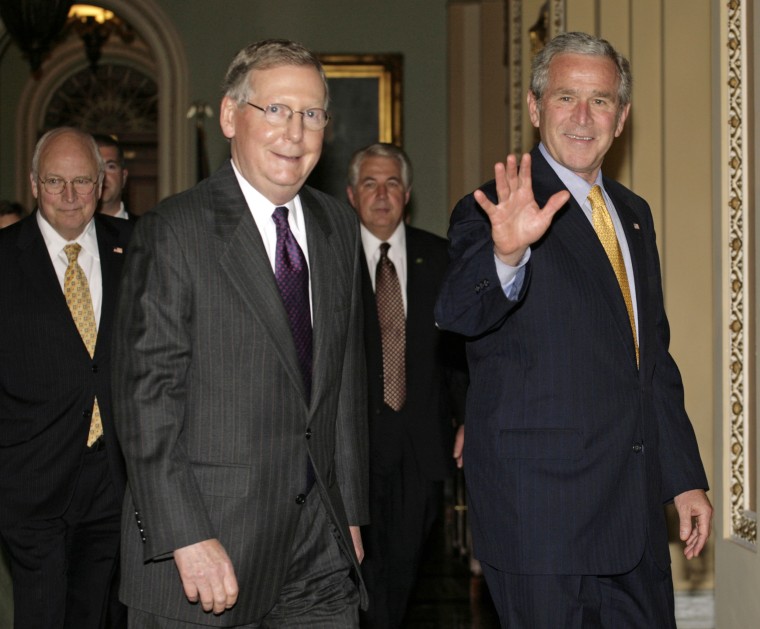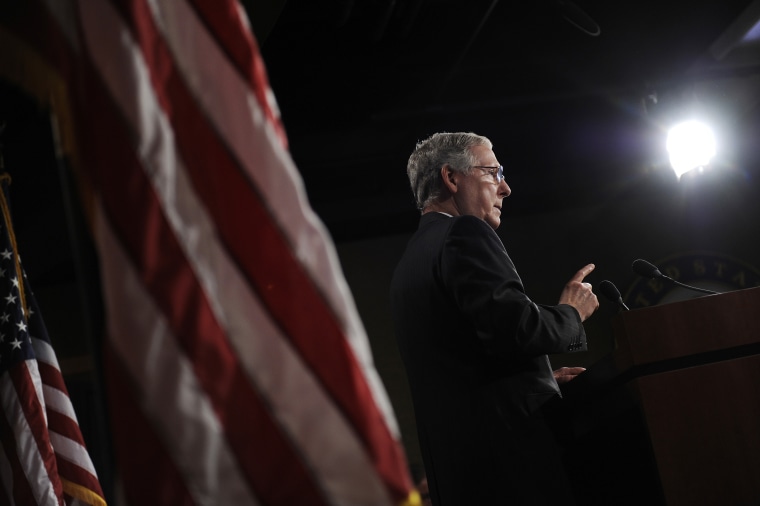WASHINGTON — If there’s one thing polarized Washington can agree on, it is this: Senate Majority Leader Mitch McConnell is a master tactician who has leveraged his deep understanding of the Senate and its rules to maximum impact.
It's a notable assessment as the Kentucky Republican hits a major milestone Tuesday by becoming his party’s longest-serving Senate leader — surpassing former Kansas Sen. Bob Dole, who served 11 years in the role from 1985-1996.
Despite that achievement, McConnell is at an unusual crossroads. He is racking up legislative wins his conservative base has long clamored for but he also must contend with his status as one of the most unpopular politicians in America — despised by Democrats and even some Republicans, especially those who helped fuel President Trump’s rise.
“Nearly every politician in Washington is obsessed with their image and that’s all they focus on. McConnell couldn't care less,” said Steven Law, a former McConnell chief of staff who now runs his associated Senate Leadership Fund. “He’s focused on winning the hard fights that matter, and that’s why he succeeds.”
McConnell’s accomplishments as leader are numerous. He has successfully advanced GOP priorities like tax cuts and deregulation and attempted to maintain unity among a diverse Republican conference while also protecting his most vulnerable members during a difficult campaign year.
Yet McConnell’s leadership is undeniably complicated in the Trump era: He must navigate working with a president whom he didn’t initially support and whose temperament and tweets he is constantly forced — and chooses — to defend.
"For people like me, this has been an extraordinarily satisfying year and a half," McConnell said in an interview with NBC News. He cited taxes, deregulation, numerous court appointments and opening up the Alaskan Wildlife Refuge for oil drilling. “On those issues,” said McConnell, “we couldn’t have asked for a better partner” than President Donald Trump.
Trump was elected as a populist, channeling the frustration of many voters who felt overlooked by the powers in Washington. And yet on those core GOP issues, McConnell told NBC News, “he’s indistinguishable from what we would have expected from a Marco Rubio or a Jeb Bush” as president.
For the past 100 years, McConnell noted, Republicans have been in control of the White House and both chambers of Congress for only about 20 years. “When these opportunities come along, you hope you can take maximum advantage, and I think we have been able to do this.”
McConnell’s streak of conservative legislative wins is a stark juxtaposition with his public image. The percentage of voters who view him positively is just 13 percent, according to the latest NBC News data. By contrast, when Dole left the Senate in 1996 to run for president, 50 percent of Americans viewed him favorably, according to Gallup data.
Many factors have contributed to the slide in McConnell’s popularity.
The Republican Party has moved in a decidedly populist direction under Trump — transitioning away from the free market, pro-business conservatism McConnell has represented for decades.
Trump blamed those longtime GOP policies for disenfranchising the middle class through bad trade deals and support for freer immigration. The fact that McConnell is also a career politician in an era where trust of government has fallen and disgust with Washington has skyrocketed hasn’t helped his image.
Trump’s polarizing rise to power has only exacerbated anti-Washington sentiment throughout the country. He’s also personally contributed to the anti-McConnell sentiment.
Through Twitter tirades, Trump blamed McConnell for Republicans’ failed effort to repeal Obamacare. Former Trump strategist Steve Bannon, before his ouster from the White House, encouraged some GOP Senate candidates to distance themselves from McConnell.
Meanwhile, some conservatives, like the Club for Growth, say McConnell’s agenda isn’t bold enough. And Democrats still seethe over his hardball handling of the Supreme Court vacancy after Justice Antonin Scalia died in 2016.
In the interview, McConnell said he is taking a long view. “I’m not worried about short-term disapproval,” said McConnell. “Some of that goes with the job of being leader,” he said, noting he was already looking ahead to his own re-election in his home state.
“I believe I can convince the voters of Kentucky in 2020 that being in this job has made a difference for our state,” said McConnell.
One longtime Senate observer said McConnell’s unpopularity is partially by design.
“He is willing to absorb that punishment. His reasoning is as follows: If they hate Mitch McConnell, they’re not going to hate individual Republican senators,” said Ross Baker, a congressional scholar at Rutgers University.
Senate Leader
Ever the skilled tactician, McConnell has managed to deflect most of Trump’s populist promises in favor of a conventional menu of conservative priorities.
He’s done so by working with House Speaker Paul Ryan and Vice President Mike Pence, who installed his own longtime aide, Marc Short, as White House legislative affairs director. Pence is often seen strategizing with lawmakers on Capitol Hill.
Trump’s pledge to build a wall on the Mexico border, tear up unfair trade agreements, and pass a huge infrastructure-spending bill have largely gone unheeded in Congress.
Instead, under McConnell’s leadership, Republicans have rolled back numerous Obama-era regulations and passed the biggest changes to the corporate tax code in more than 30 years. He’s spent the year ushering through young, conservative judges who will shape the federal bench for a generation, confirming a record-breaking 21 circuit court judges — and 20 district court judges.
Short told NBC News there is no doubt Trump’s record is distinguished by “a lot of conservative victories.” Still, he said, “I don’t think it’s fair to say there’s a Pence, McConnell, Ryan triumvirate that is guiding his agenda away from things he wants to do.”
Neil Gorsuch
McConnell’s most significant accomplishment in the eyes of many conservatives is how he paved the way for President Trump’s early Supreme Court nominee.
“Two words: Neil Gorsuch,” Louisiana Republican Sen. John Kennedy told NBC News.
After Scalia’s death, McConnell refused to allow the Senate to consider Merrick Garland, who had been President Obama’s nominee to take the position. With a presidential election just months away, McConnell argued, the job of choosing the justice should fall to the next president, not Obama.
The gamble paid off. After Trump was elected, he promptly tapped the conservative Gorsuch for the seat. McConnell then took the unprecedented step of suspending the Senate’s 60-vote requirement to secure Gorsuch's confirmation.
Many Democrats remain enraged by McConnell’s tactics around the court vacancy, saying that he essentially stole the seat. Illinois Democratic Sen. Dick Durbin told NBC News it will be remembered a “stain on the history of the Senate.”
Law, the former McConnell chief of staff, maintains that “the way in which it happened defines McConnell’s unique skill.”
More recently, McConnell announced he would cancel the Senate’s August recess, chastising Democrats for “blocking” Trump nominees and vowing to pass a series of appropriations bills. It also had the desired effect of keeping several vulnerable Democrats off the campaign trail at a time when the map already favors the GOP.
The “McConnell Lockdown”
But with McConnell’s success comes his weakness.
Senators of both parties grumble about what they call the “McConnell lockdown:” He keeps such a tight grip on power that few dare to challenge him. The Senate floor sees little debate and few votes on legislation.
Missouri Republican Sen. Roy Blunt, a member of Senate leadership, defended McConnell’s approach this way: “My view is that Senator McConnell appreciates and understands the Senate better than any current member of the Senate and he uses those skills every day.”
Frustration with McConnell has been bubbling nonetheless, senators and aides in his own party say in private conversations. When asked to comment about how they feel about McConnell’s leadership for this story, several Republican senators declined to comment.
One reason there have been so little floor activity, defenders say, is that McConnell wants to protect vulnerable incumbents seeking reelection from taking tough votes that might prompt blowback.
House Republicans complain that they have passed 500 bills only to see them sit languishing in the Senate. Bipartisan legislation crafted in the Senate often goes nowhere, including criminal justice reform, an updated Authorization for the Use of Military Force, legalization of marijuana protection bill and a reprimand of the Burmese government for the ethnic cleansing of the Rohingya.
Kennedy told NBC News that McConnell is simply looking out for the Republican conference. “Now Mitch and I don’t agree on every issue, but he takes a lot of arrows for a lot of senators, adding that “he’s very good at it.”

Many conservatives blame McConnell for the party’s broken promise to repeal Obamacare and for signing off on a massive spending bill that contradicted years of GOP insistence on limited government.
“The failures of the Republican Senate under his leadership have made it hard for the Republican base to get excited about voting,” David McIntosh, president of the Club for Growth, told NBC News.
McConnell explains the paucity of floor votes by saying he often doesn’t have the necessary 60 votes, which must include Democrats, to pass anything. Trump has repeatedly pushed McConnell to change the Senate rules so that a only simple majority of 51 votes is needed to pass legislation, something he has so far resisted.
McConnell’s chess moves are often a mystery to those closest to him. He only shares information with his Republican conference when he needs to and even keeps members of his leadership team in the dark.
It all adds to the sense of frustration for some.
The Senate has become “so dysfunctional” no one even tries to identify areas of agreement before drafting legislation, said Sen. Ron Johnson, R-Wis., a longtime McConnell critic.
“This isn’t just with leader McConnell. It’s this place," said Johnson. "They’re divorced from reality.”
Durbin, a Democrat, offered grudging admiration for McConnell’s successes in the Trump era.
“This is a very difficult administration to deal with. There are very few people, if any, who have experience in the White House in dealing with the Congress and the president is unstable and unpredictable.”
